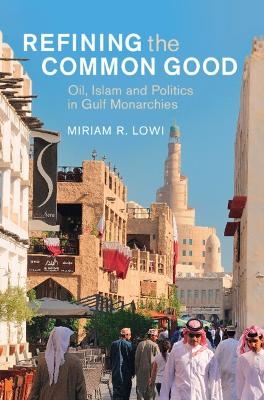
Refining the Common Good
Oil, Islam and Politics in Gulf Monarchies
Seiten
2024
Cambridge University Press (Verlag)
978-1-009-46331-7 (ISBN)
Cambridge University Press (Verlag)
978-1-009-46331-7 (ISBN)
- Lieferbar (Termin unbekannt)
- Versandkostenfrei
- Auch auf Rechnung
- Artikel merken
This innovative study explores a novel dimension of elite politics in Arab Gulf monarchies where both oil and Islam are ubiquitous: how rulers exploit both oil revenues and Islamic norms to manage and control their populations, build community, and protect and enrich dynastic autocracies.
How has Islam as a set of beliefs and practices shaped the allocation of oil revenues in Arab Gulf monarchies? In turn, how has oil wealth impacted the role of Islamic doctrine in politics? Refining the Common Good explores the relationship between Islamic norms and the circulation of oil wealth in Gulf monarchies. The study demonstrates how both oil (revenues) and Islam (as doctrine) are manipulated as tools of state power, and how religious norms are refined for the sake of achieving narrow secular interests. Miriam R. Lowi examines different institutionalized practices financed by hydrocarbon revenues and sanctioned, either implicitly or explicitly, by Islam, and uses evidence from Kuwait, Qatar, Oman and Saudi Arabia to show how these practices are infused with political purpose. The dynamic relationship between oil wealth and Islamic doctrine is exploited to contribute to the management and control of society, and the consolidation of dynastic autocracy.
How has Islam as a set of beliefs and practices shaped the allocation of oil revenues in Arab Gulf monarchies? In turn, how has oil wealth impacted the role of Islamic doctrine in politics? Refining the Common Good explores the relationship between Islamic norms and the circulation of oil wealth in Gulf monarchies. The study demonstrates how both oil (revenues) and Islam (as doctrine) are manipulated as tools of state power, and how religious norms are refined for the sake of achieving narrow secular interests. Miriam R. Lowi examines different institutionalized practices financed by hydrocarbon revenues and sanctioned, either implicitly or explicitly, by Islam, and uses evidence from Kuwait, Qatar, Oman and Saudi Arabia to show how these practices are infused with political purpose. The dynamic relationship between oil wealth and Islamic doctrine is exploited to contribute to the management and control of society, and the consolidation of dynastic autocracy.
Miriam R. Lowi is Professor in the Department of Political Science at The College of New Jersey. She is the author of Oil Wealth and the Poverty of Politics: Algeria Compared (Cambridge University Press, 2009) and Water and Power: the Politics of a Scarce Resource in the Jordan River Basin (Cambridge University Press, 1993).
1. Oil and Islam in the Gulf; 2. Islamic norms, interpretations, applications; 3. The state and the political economy of distribution; 4. Society responds; 5. Imported labor: building/appeasing the nation; 6. Charity as politics 'writ small'; 7. Islamic banking and finance: a political economy of accumulation; 8. Reflections on Islam and politics in the oil era.
| Erscheinungsdatum | 05.11.2024 |
|---|---|
| Reihe/Serie | Cambridge Middle East Studies |
| Zusatzinfo | Worked examples or Exercises |
| Verlagsort | Cambridge |
| Sprache | englisch |
| Themenwelt | Sozialwissenschaften ► Politik / Verwaltung ► Politische Systeme |
| Sozialwissenschaften ► Politik / Verwaltung ► Politische Theorie | |
| Wirtschaft ► Volkswirtschaftslehre ► Wirtschaftspolitik | |
| ISBN-10 | 1-009-46331-4 / 1009463314 |
| ISBN-13 | 978-1-009-46331-7 / 9781009463317 |
| Zustand | Neuware |
| Informationen gemäß Produktsicherheitsverordnung (GPSR) | |
| Haben Sie eine Frage zum Produkt? |
Mehr entdecken
aus dem Bereich
aus dem Bereich
eine Einführung
Buch | Softcover (2023)
Springer VS (Verlag)
CHF 55,95


